INFORMATION ABOUT TRAUMATIC BRAIN INJURY
This booklet is a resource to support people who have sustained traumatic brain injury and their family caregivers. It is designed to provide information about TBI education and knowledge regarding changes that commonly occur when a person has sustained a TBI, how best to care for and communicate with a person with TBI and strategies to deal with the common physical, cognitive, behavioral and emotional changes. Being equipped with the necessary information to provide care can potentially enhance caregivers’ coping and alleviate fear
WHAT IS TRAUMATIC BRAIN INJURY (TBI)?
Traumatic brain injury (TBI) occurs when a sudden trauma such as a blow to the head caused damage to the brain. These injuries can affect a person’s physical, cognitive, emotional and behavioral functioning. These changes, in turn can have an impact on capacity to look after oneself, do household tasks, drive, get around in the community, work, study and/or engage in leisure activities. They can also affect relationships. Living with these changes can make the person with a brain injury depressed or anxious. It can also have effects on their family.
WHAT CAUSES TBI
Accidents such as falling, car accidents, sports-related injuries and physical fights are common causes of TBI
WHAT HAPPENS AFTER A TBI?
A TBI can make you lose consciousness for some time and then be confused for a period after that. For people with milder injuries there may be full recovery within a few weeks. After moderate to severe TBI Improvement takes place more rapidly at first and then more slowly up to 1-2 years after the injury. Recovery is not always complete, however. There may be physical disabilities affecting movement, or sensation on one or both sides of the body, as well as reduced balance and co-ordination. There may also be problems with articulating speech, with swallowing, reduced sense of smell or taste, as well as visual and hearing problems. All of these may improve over time or with therapy.
Some of the most common and persistent symptoms experienced after a TBI include:
While most of these problems will lessen over time after injury, some will persist. Therefore it is important to understand their causes and ways of coping with them.
WHAT YOU CAN DO TO MANAGE SYMPTOMS
1. Headaches

Headaches are part of the normal recovery process. Frequent headaches can affect you mentally and emotionally. They are a common cause of irritability and concentration problems following a head injury. Sometimes doctors can prescribe medication to reduce headaches. One common contributor to headaches following a head injury is fatigue, concentrating too long and stress. Sleeping, resting or taking a break from activities requiring concentration or effort will usually relieve headaches. You could also try muscle relaxation. If your headache gets worse, or cannot be relieved, see your doctor.
Helpful Tips
- ● Rest, sleep, meditation and muscle relaxation may be helpful
- ● Consult a doctor if the headaches persist
- ● Get enough rest
2. Balance Problems and Dizziness
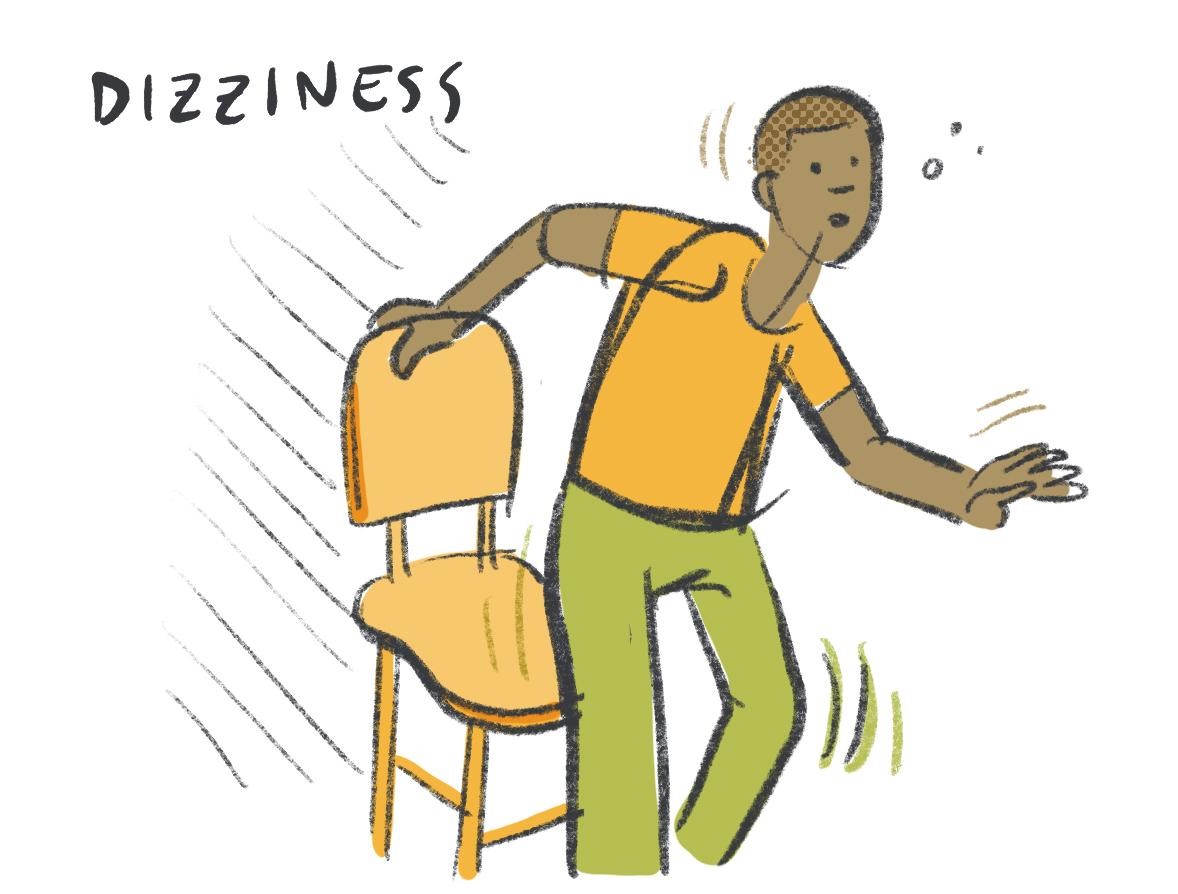
Balance is the ability to keep your body centered over your feet. People with traumatic brain injury commonly report problems with balance when walking. Many people with TBI also experience dizziness when moving around or changing position suddenly. Poor balance and dizziness can increase the risk of falling and having further injury. Poor balance and dizziness can keep you from taking part in many types of activities such as sports, driving and work.
Helpful Tips
- ● Consult your doctor or physiotherapist as there are exercises that can help balance and reduce dizziness
- ● Try to avoid moving quickly or on uneven ground or changing position suddenly
- ● When outdoors it may help to use a cane to support yourself when you are walking
- ● Try and do things a bit slower
3. Eye Problems
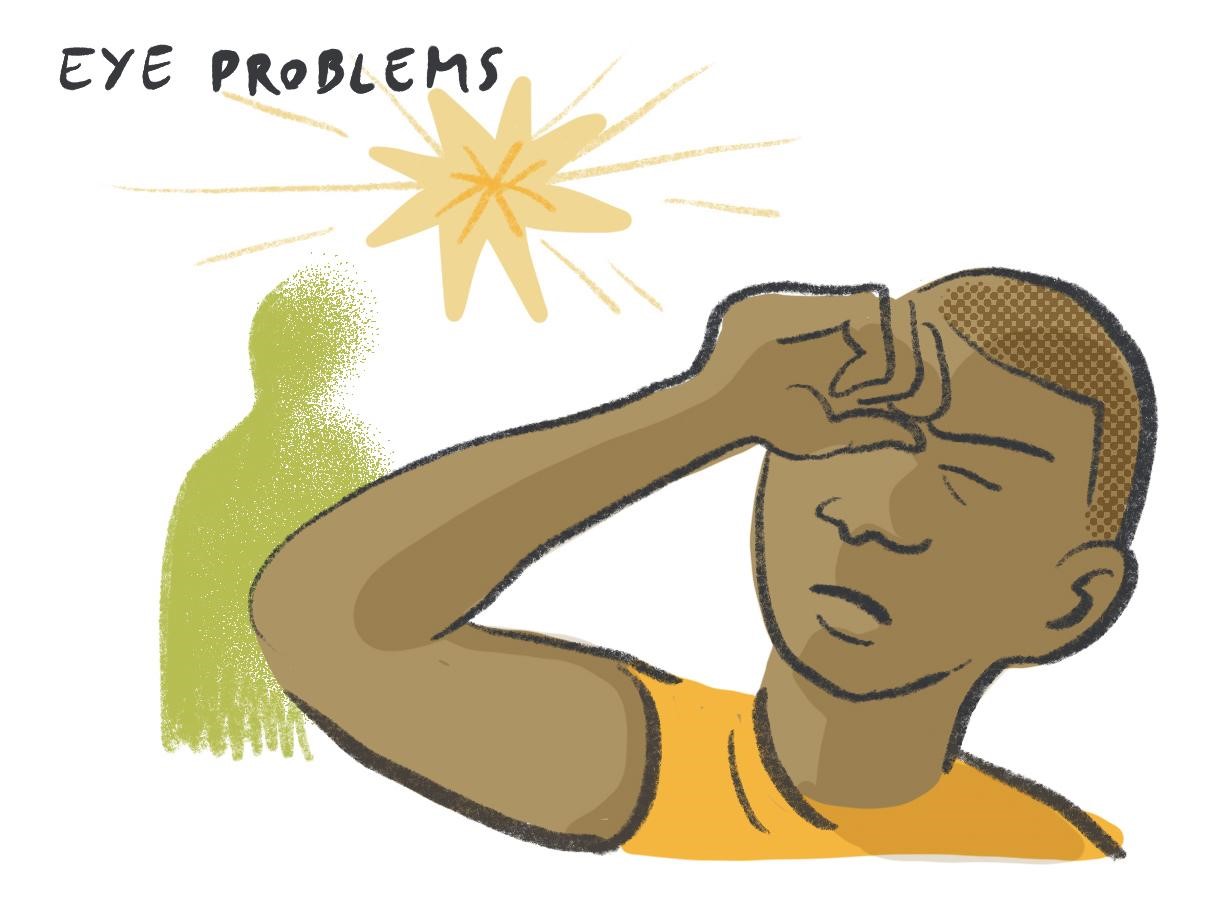
You may have difficulty focusing, so that things look blurred or double, or you may find that your eyes are sensitive to bright light.
Helpful Tips
- ● Discuss the problem with your doctor.
- ● Wear an eye patch if you have double vision.
- ● Wear dark glasses in strong light.
- ● If you wear glasses, go back to your optician to have them adjusted once your recovery has stabilised. It probably is not that your sight has changed, but that your brain is not putting together the messages from each eye as well as it normally does. This often settles down over time, but consult your doctor if it persists.
4. Sensitivity to noise
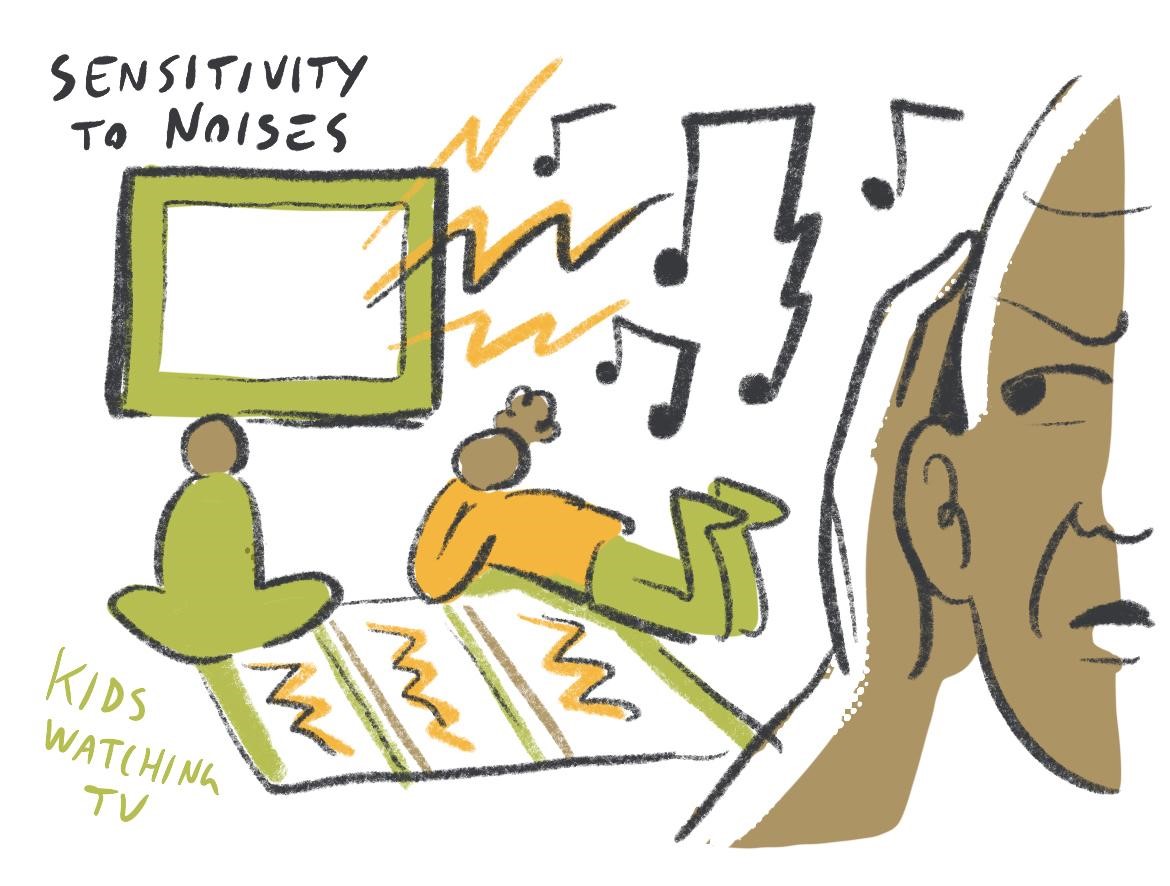
After a brain injury your brain may not have enough energy to spare to damp down noises that interfere with what you are doing. You may find that most noises bother you. This usually settles down over time.
Helpful Tips
- ● Explain to your family and friends, and ask them to keep the noise level down if they can.
- ● If you have a very young family who could not be expected to understand, remove yourself from the noisy situation
- ● Make a quiet place in your house that you can escape to.
- ● If things are noisy at work, ask your boss if you can work in a quieter area
- ● Avoid crowds
5. Fatigue

Fatigue is a feeling of tiredness or lack of energy. When you are fatigued, you are less able to think clearly and do physical activities. You are less likely to be able to take care of yourself or do the things you enjoy. Fatigue can have a negative effect on your mood, physical functioning, concentration, memory and communication. Fatigue is one of the most common problems people have after a traumatic brain injury. Learn to pace yourself. If you feel tired, have a rest or short nap to recharge your energy levels. Your brain needs more sleep to help it get better. But be careful not to nap so much that you cannot sleep well at night.
Helpful Tips
- ● Do the most demanding tasks in your day early, when you feel fresh
- ● Take regular rest breaks so you don’t push yourself to become exhausted
- ● Have a diary to understand patterns and triggers of fatigue
- ● Follow a regular sleep schedule - Try to sleep for at least 7-8 hours.
- ● Deal with one thing at a time
- ● Allow yourself extra time to complete tasks or try to reduce time pressure.
- ● Simplify tasks whenever possible
- ● Get help to become and stay organized
6. Sleep Difficulties

Sleep disturbance is very common following a brain injury. Studies have shown that individuals who suffer a brain injury often have difficulty getting to sleep, wake up during the night, or have trouble waking up in the morning. Getting adequate sleep is very important in the healing processes.
Helpful Tips
- ● Go to bed and wake up roughly the same time each day
- ● Avoid napping during the day if you are having trouble sleeping at night
- ● Avoid caffeine, especially in the evening
- ● Avoid exercising or eating late in the evening
- ● Ensure your bedroom is quiet and dark
- ● Avoid using your computer or smartphone just before bedtime
- ● Don’t lie in bed awake for long periods, but get up and do something relaxing in dim light until you feel sleepy again
- ● Avoid worrying about things in bed
- ● Use relaxation strategies to help you get to sleep.
7. Cognitive Problems

Cognition is the act of knowing or thinking. It includes ability to choose, understand, remember and use information. After TBI it is common for people to have problems with concentration, speed of thinking, learning and memory, reasoning, planning and problem-solving and communication.
8. Poor Concentration and Slowed Thinking
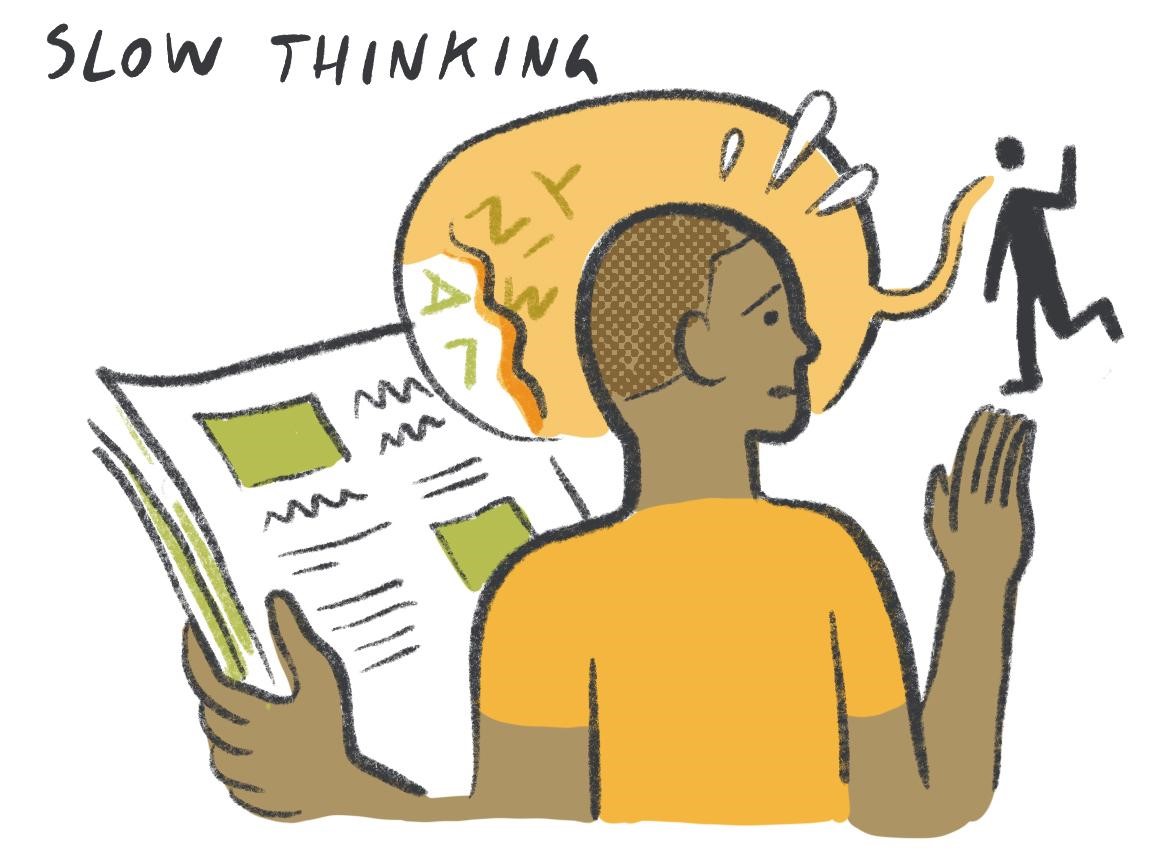
Many people who suffer from traumatic brain injury find it difficult to concentrate. Poor concentration is often caused by slowed thinking and is made worse by tiredness. This may result in:
- ● Being easily distracted
- ● Having difficulty doing more than one thing at a time
- ● Feeling overwhelmed
- ● Missing important details
- ● Having trouble keeping up with things, for example when people are talking
- ● Having difficulty sitting still for long periods
Helpful Tips
- ● Decrease distractions
- ● Focus on one task or person at a time
- ● Take breaks when you get tired
- ● Change to a different activity if you lose focus
- ● Try to slow down the pace of tasks
- ● If you have trouble keeping up, ask people to repeat themselves, make notes or tape-record conversations or meetings.
- ● Check things carefully to see that you have not missed details
9. Memory Problems

Many people find they are not so good at remembering things after a TBI
Helpful Tips
- ● Remember that everyone has trouble remembering things. There is no cure for memory problems so we need to get around them.
- ● Write down important things to remember
- ● Keep lists or notes
- ● Use a diary or smartphone to plan your day and check off tasks, appointments or activities as they are completed
- ● Program your smartphone to remind you to do things
- ● Always put things such as your keys, wallet or phone in the same place so you do not lose them
- ● When meeting someone and wanting to remember their name, repeat it to yourself several times at increasing intervals or write it down
- ● Try to remember landmarks of where you are going or parking your car so you do not get lost
- ● Make stories or pictures in your head to help you remember important things.
- ● Ask a relative or friend to remind you of things.
- ● Your memory will be best when you are rested and able to pay attention, so make your you get enough sleep and rest and eat healthily.
10. Poor Reasoning, Planning and Problem-solving
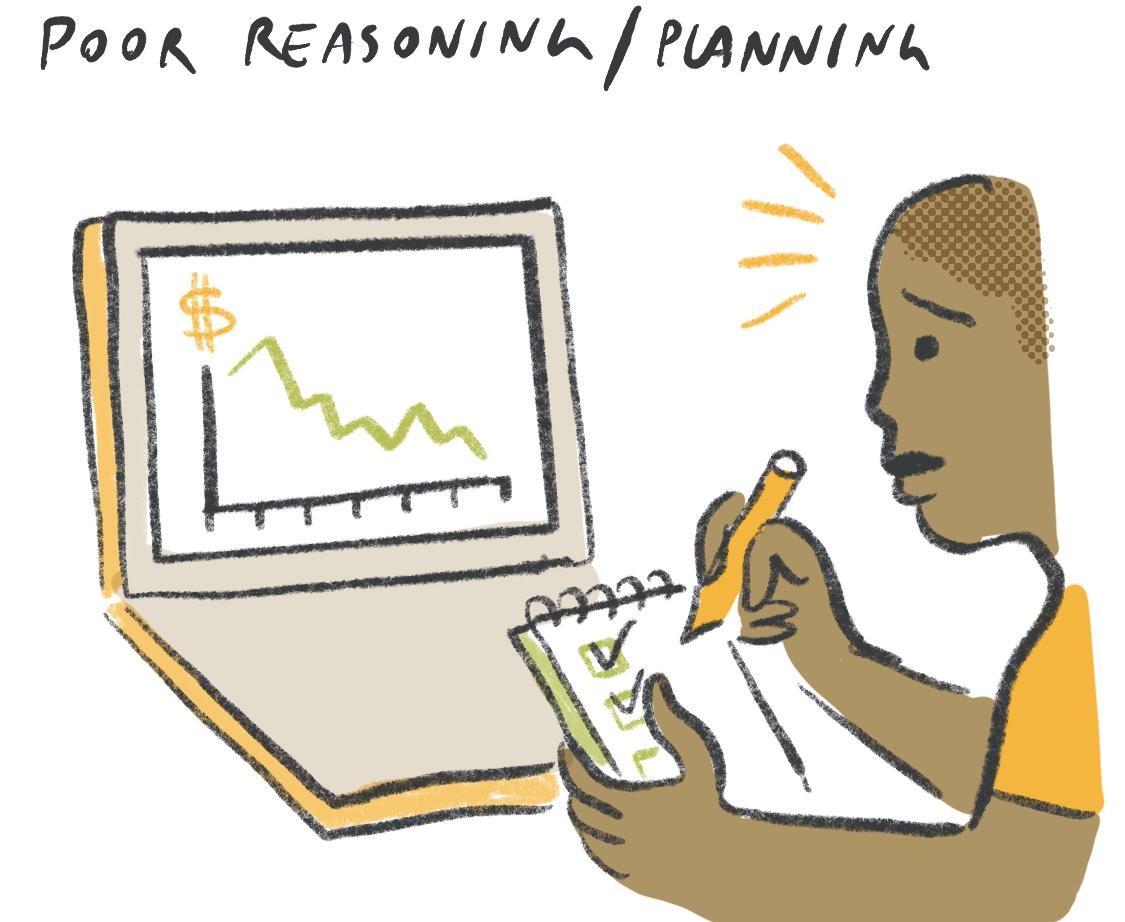
Many people with a brain injury find it difficult to make decisions and to plan and solve problems. This may result in:
- ● Having difficulty making decisions
- ● Acting impulsively
- ● Not managing money well
- ● Not achieving things you want to get done
Helpful Tips
- ● When you are faced with a problem, write down the options for solving it and weigh up the pros and cons of each, or discuss it with someone
- ● Tell yourself to stop and think before you act or ask others to help you do so
- ● Limit how much money you have to spend each week
- ● Ask someone to help you manage your money
- ● Make a written plan of what you want to do and the steps you need to get there, and tick these off as you do them; Do this each day
- ● Try to simplify activities in your life, just doing one thing at a time
11. Difficulty communicating
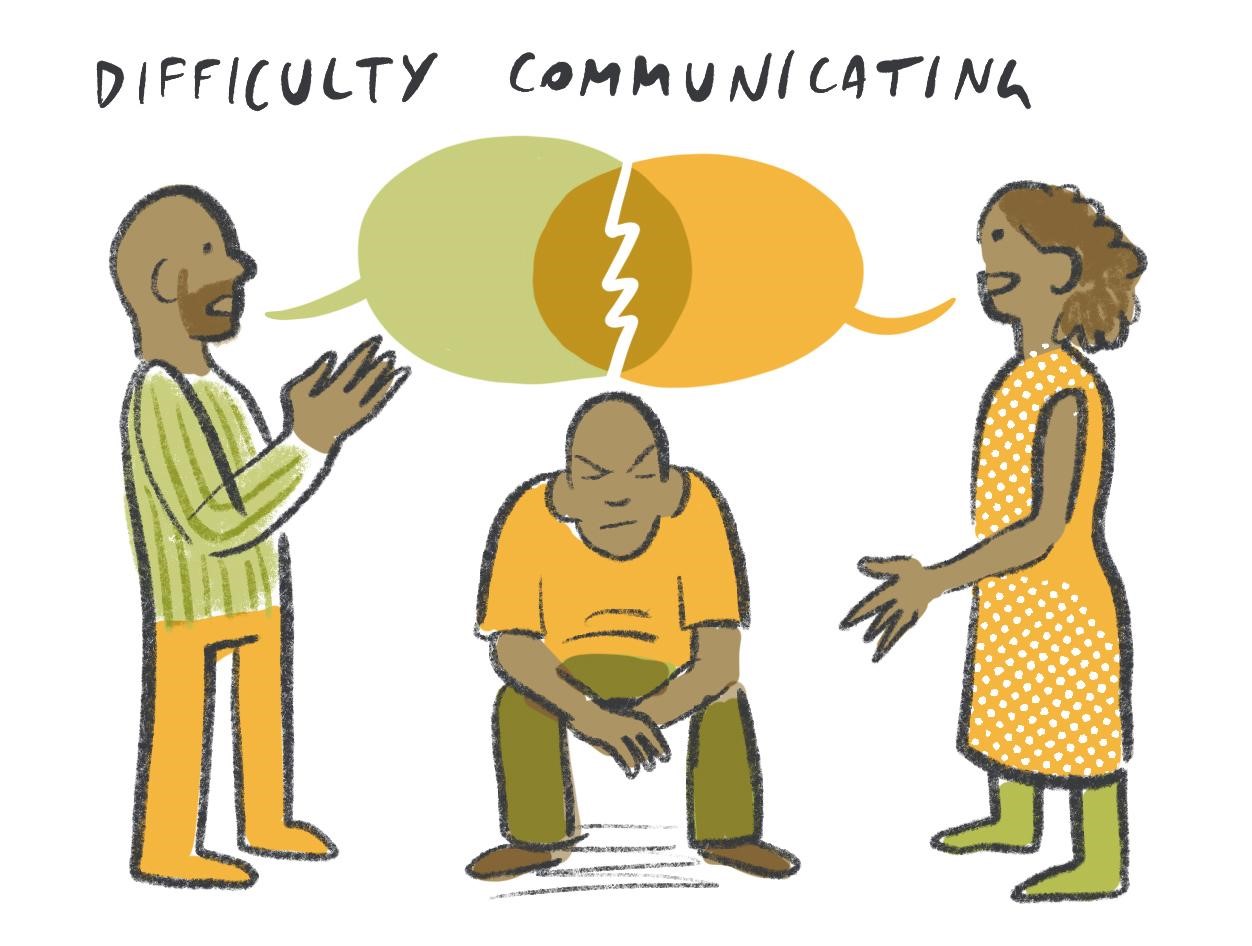
Another common problem is having trouble communicating with others, at home, at work or with friends. This may be caused by:
- ● Having trouble keeping up with conversations
- ● Having difficulty thinking of words to express yourself
- ● Talking too much
- ● Not listening to others
- ● Not understanding how others are feeling, when they are angry or sad
Helpful Tips
- ● Avoid talking to more than one person at a time
- ● Ask people to repeat themselves if you have not fully understood
- ● Give yourself time to think of words by imaging things associated with them – they usually come back later so don’t get too stressed.
- ● Ask others to tell you or give you a signal if you are talking too much or interrupting
- ● Remind yourself to listen to others
- ● Ask others to tell you honestly how they are feeling rather than expecting you to read it in their faces or body language
Emotional and Behavioural Problems

Mood Swings
A brain injury can change the way people feel or express emotions or their ability to control their behaviour. Usually the person cannot control these expressions of emotions or behaviours. Sometimes they become upset easily or show rapid changes in mood that are out of proportion to the situation.
Helpful Tips
- ● Explain to others that you are sometimes easily upset and laugh or cry for no apparent reason
- ● If you are suddenly feeling down or upset, remember the feeling is likely to pass
- ● Try to get away from the situation that set it off and get your mind onto something pleasant.
- ● Avoid getting tired as that may set off sudden changes in mood
- ● Seek help from your doctor or psychologist
Irritability
Getting frustrated, irritated or angry more easily is a really common problem after brain injury. This may result in you:
- ● Losing patience with people
- ● Yelling at or even hitting your family or others
- ● Having trouble in relationships at work, with friends, your partner, or family
Helpful Tips
- ● Try to recognize when you are starting to get angry before it gets out of control
- ● When you feel yourself getting uptight or angry, go out of the room or away from the situation
- ● Take deep breaths
- ● Try other relaxation techniques
- ● Use up energy by hitting a punching ball, riding a bike or going for a run.
- ● Avoid getting tired as that makes you more easily irritable
- ● Avoid noisy situations.
- ● Try to keep track of the situations in which you are most likely to get irritable and avoid these situations.
- ● If anger is causing problems in your life talk to a doctor or psychologist to get help
Depression
Depression is a feeling of sadness, loss or hopelessness that does not get better over time and is overwhelming enough to interfere with daily life. Depression is very common problem after TBI. More than half of the people with TBI who are depressed also have significant anxiety.
Symptoms of depression include:
- ● Feeling down, sad, blue or hopeless
- ● Loss of interest or pleasure in usual activities
- ● Feeling worthless, guilty or that you are a failure
- ● Changes in sleep, including trouble getting to sleep, staying asleep and waking up
- ● Loss of appetite
- ● Difficulty concentrating
- ● Withdrawing from others
- ● Tiredness or speaking more slowly
- ● Thoughts of deaths or suicide
Helpful Tips
- ● If you have symptoms of depression, it is important to tell someone. Start by telling a family member or friend
- ● Tell your doctor who may give you medication or arrange counselling.
- ● You cannot get over depression by simply wishing it away. It is best to get treatment early to prevent suffering and worsening symptoms
Anxiety
Anxiety is also common after a brain injury, often occurring along with depression. It is characterised by feelings of worry, stress, anxiety or fear that are strong enough to interfere with your daily activities. After a brain injury many people worry about their future, being unable to care for their family or earn money. Sometimes people are fearful of situations similar to those in which they were injured, such as crossing roads or driving a car or being in crowds. They may have nightmares about events related to the accident.
Symptoms of anxiety include:
- ● Feeling tense, nervous or wound up
- ● Constantly worrying
- ● Being afraid of things
- ● Avoiding going out
- ● Feeling restless
- ● Thinking about the accident all the time
- ● Having nightmares or flashbacks relating to the accident
- ● Having trouble getting to sleep or waking up suddenly after nightmares
- ● Feeling detached from others
- ● Having difficulty concentrating
Helpful Tips
- ● If you have symptoms of anxiety, it is important to tell someone. Start by telling a family member or friend
- ● Tell your doctor who may give you medication or arrange counselling.
- ● You cannot get over anxiety by simply wishing it away. It is best to get treatment early to prevent suffering and worsening symptoms.
Personality Changes
Sometimes people seem different after a brain injury. This may result in them:
- ● Getting easily upset, frustrated or angry
- ● Having difficulty communicating
- ● Being more self-centred because they cannot understand how others are feeling
- ● Lacking awareness of injury-related changes
- ● Having trouble in relationships at work, with friends, your partner, or family
Helpful Tips
- ● Try to understand that these changes are related to the brain injury. The person cannot control them.
- ● Give feedback, but in an understanding way and don’t expect them to be able to change
- ● Try to focus on the good things about them and encourage those things.
- ● Get support from a doctor or counsellor
Alcohol and drug Use after traumatic brain Injury
Alcohol use and TBI are closely related. Many people with TBI have a history of alcohol abuse or risky drinking. Drinking increases your chances of being injured again and makes thinking problems worse. It also increases your chances of having emotional problems such as depression. Drinking can also reduce brain injury recovery. Therefore it is best to avoid alcohol after a TBI. Other drugs should also be avoided.
IMPORTANT INFORATION FOR CARE-GIVERS OF TRAUMATIC BRAIN INJURY PATIENTS
Care-givers often receive limited information regarding their relatives’ injuries and methods of managing them. Some care-givers feel anxious or depressed as they face these challenges.
Behaviour problems are most troubling for families.
These may include irritability and aggression, being easily frustrated, being impulsive, having mood swings, behaving inappropriately in social situations, being more self-centred or needing prompting to do things. Sometimes the person with a brain injury is not aware of these changes, which makes it difficult to get them to change their behavior. Sometimes it is easier not to be too confronting, and to learn to avoid the situations that trigger these problems.
COMMON CHALLENGES FACED BY CARE-GIVERS
- ● Lack of knowledge about the patient’s brain injury and its effects or how to deal with them
- ● Fear about the future
- ● Social isolation and loss of emotional supports
- ● Marital stress
- ● Loss of freedom
- ● Financial burden
- ● Health challenges
- ● Depression
- ● Anxiety
- ● Stress
- ● Loss of motivation
CARE-GIVERS CAN DO TO OVERCOME CHALLENGES
- ⮚ Ask your doctor or local nurse for more information
- ⮚ Use some of the strategies recommended in this booklet
- ⮚ Show the booklet to others in your family so they also understand
- ⮚ Your injured relative cannot help the changes they are experiencing. They are caused by damage to certain brain areas. They are not due to madness or evil spirits.
- ⮚ Remember that brain injuries usually improve over time
- ⮚ Take care of the caregiver first!
- ⮚ Seek practical or financial help from other family members
- ⮚ Talk to other family members or a friend to share the load
- ⮚ Get professional help, for example counseling when you feel overwhelmed
- ⮚ Talk to a social worker about your financial challenges
- ⮚ Seek medical attention whenever you are not feeling well
- ⮚ Take time for yourself, for example reading books, meditation, visiting friends/relatives and exercising. Look for another person or family in your situation and talk to them, or even better, form a support groups with other care-givers to share information and support each other. They can also invite a health professional to teach the about traumatic brain injury.